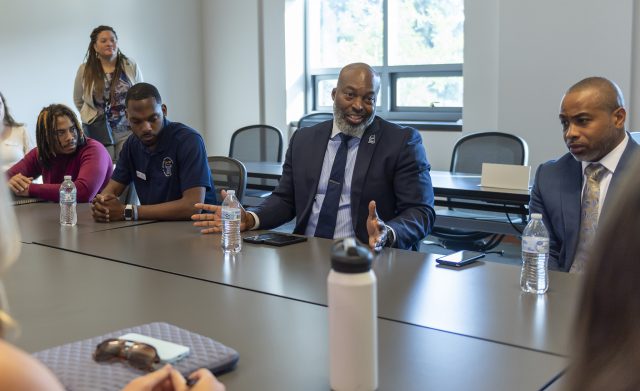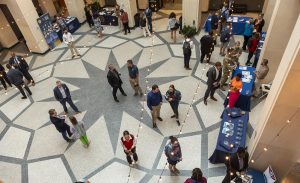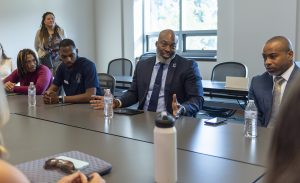
Jermicha Fomby (center), special agent in charge of the Mississippi FBI branch, and Torreon Creekmore (right), senior cybersecurity engineer for the National Geospatial-Intelligence Agency, speak with students during the ‘City of Spies Meets City of Oxford’ symposium hosted by the Center for Intelligence and Security Studies. The event was organized in partnership with the Intelligence Community Center for Academic Excellence. Photo by Srijita Chattopadhyay/Ole Miss Digital Imaging Services
OXFORD, Miss. – The University of Mississippi Center for Intelligence and Security Studies partnered with the Office of the Director of National Intelligence to host a large group of intelligence community representatives Tuesday (Oct. 10) as a part of the “City of Spies Meets City of Oxford” symposium.
Representatives from more than a dozen intelligence agencies participated on panels and a career fair and met with students to chat about opportunities and realities of working in the intelligence community.
“These networking events are great opportunities for students to engage with IC representatives from multiple agencies,” said Shaio Zerba, director of the Center for Intelligence and Security Studies.
“With these interactions, students come away feeling more motivated and confident they have the education and skills to contribute to the intelligence mission.”
In 2012, UM was one of the first universities in the country to be designated an Intelligence Community Center for Academic Excellence. The UM program focuses on educating and training qualified intelligence professionals.

Students and professionals from more than a dozen intelligence groups mingle at a career fair Tuesday (Oct. 10) during the ‘City of Spies Meets City of Oxford’ symposium. Photo by Srijita Chattopadhyay/Ole Miss Digital Imaging Services
FBI Special Agent Kisha Winston, chief of the Intelligence Community Human Capital Emerging Talent Group, helped organize Tuesday’s event. Networking opportunities such as this one help students better understand the field, she said.
“We’re educating the new generation of the intelligence community,” Winston said. “I hope this opens their eyes to the career opportunities available to them here.
“I hope students move away from this wanting to be public servants and realizing that their uniqueness is exactly what the intelligence community needs.”
Many people perceive the intelligence community simply as a collection of spies, but it is actually a complex network of people working across the globe to gather and interpret information, said Joel Webber, of the Office of the Director of National Intelligence.
Information from the intelligence community, for example, helped notify the world of Russia’s intent to invade Ukraine in 2022, Webber said.
“This is what the intelligence community is today,” he said, referring to a slideshow featuring a half-dozen headlines announcing Russia’s intent to invade. “We were able to turn classified intel on a dime.
“We convinced the world that Russia is planning a massive attack, and the Russians got smashed.”
A panel of seven Ole Miss alumni and professionals who work in the intelligence community answered student questions about details of the jobs available and how best to prepare for them. When asked what would most stand out on a resume, Dennis Latour, intelligence specialist for the Office of Naval Intelligence, said he looks for students who have knowledge of the intelligence community.

Jermicha Fomby (center), special agent in charge of the Mississippi FBI branch, speaks with students during one of the sessions of the symposium. Photo by Srijita Chattopadhyay/Ole Miss Digital Imaging Services
“The biggest thing that we’re looking for is students who come from intelligence and security studies programs,” LaTour said. “It puts you head and shoulders above other candidates.
“You’re coming in day one understanding the basics of tradecraft. That, to me, is really big.”
Being able to work in teams and in changing environments is critical to flourishing in the intelligence community, said Torreon Creekmore, senior cybersecurity expert for the National Geospatial-Intelligence Agency.
“I would rather take someone who doesn’t know anything and gets along with people than the person who knows everything and cannot work within the team,” Creekmore said.
Students from any field or major are welcome to join the intelligence community, said Jermicha Fomby, special agent in charge of the Mississippi FBI branch.
“We’re not just looking for people; we’re looking for good people, people who are motivated and responsible,” Fomby said. “If everyone had the same degree and thought the same way, we’d have a limited scope of results.”
Hannah Bradford, a senior mechanical engineering major from Tupelo, said she attended the event in hopes of finding opportunities for engineers to work abroad.
“I’m really interested in doing foreign work, and I thought this could really apply to me,” Bradford said.
Isaiah White, a junior criminal justice major from Water Valley, aspires to work for the Department of Homeland Security. He said events like this one are critical for becoming comfortable speaking with people in the intelligence community.
“You get to meet people in the space where you want to work,” White said. “It opens you up so you aren’t so nervous talking to these people.
“If they didn’t have events like these, I wouldn’t really be as confident with them as I am.”